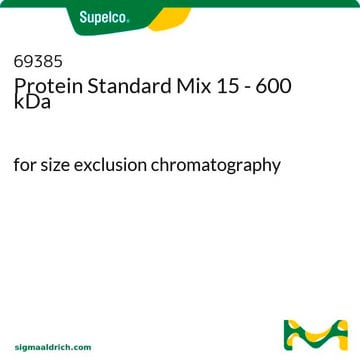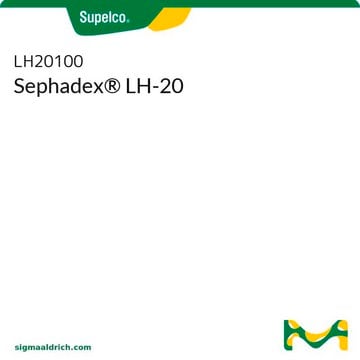2114-M
Detergent-OUT Micro Kit
Iniciar sesiónpara Ver la Fijación de precios por contrato y de la organización
About This Item
UNSPSC Code:
41116012
eCl@ss:
32160405
NACRES:
NB.24
Productos recomendados
technique(s)
protein clean-up: suitable
application(s)
sample preparation
General description
The Chemicon Detergent-OUT Kit is a simple high performance method for removing detergents from protein solutions. Removes detergents without significant dilution of protein solution. Simply load the protein solution on the Detergent-OUT Spin column and collect detergent free protein solution. Micro columns are suitable for removing detergent from a maximum of 0.2 mL sample volume.
Application
PROTOCOL:
1. Invert the column several times to re-suspend the resin material. Remove the tip of the column and let the liquid drain off.
2. Buffer Equilibration: SpinOUT columns are supplied in deionized water. Equilibrate the column with a buffer of your choice, as follows. Note: Do not equilibrate the columns with Tris buffer. Apply about 0.5 mL of a desired buffer into the column. Let the buffer drain into collection tube. Repeat this process 3 times.
3. Place the column in a 2.0 mL micro-centrifuge tube. Centrifuge at 1000 xg for 20-30 seconds. Discard the liquid collected in the centrifuge tube.
4. Place the column back in the same centrifuge tube. Carefully apply the protein suspension to the center of the column. Wait for 1-2 minutes. Note: If your protein solution is in Tris buffer, exchange the protein solution buffer to phosphate or other buffer, using either a SpinOUT column or by dialysis.
5. After loading the column centrifuge at 1000 xg for 20-30 seconds. Collect the liquid comprising purified protein material free from detergent originally present in the sample.
1. Invert the column several times to re-suspend the resin material. Remove the tip of the column and let the liquid drain off.
2. Buffer Equilibration: SpinOUT columns are supplied in deionized water. Equilibrate the column with a buffer of your choice, as follows. Note: Do not equilibrate the columns with Tris buffer. Apply about 0.5 mL of a desired buffer into the column. Let the buffer drain into collection tube. Repeat this process 3 times.
3. Place the column in a 2.0 mL micro-centrifuge tube. Centrifuge at 1000 xg for 20-30 seconds. Discard the liquid collected in the centrifuge tube.
4. Place the column back in the same centrifuge tube. Carefully apply the protein suspension to the center of the column. Wait for 1-2 minutes. Note: If your protein solution is in Tris buffer, exchange the protein solution buffer to phosphate or other buffer, using either a SpinOUT column or by dialysis.
5. After loading the column centrifuge at 1000 xg for 20-30 seconds. Collect the liquid comprising purified protein material free from detergent originally present in the sample.
Packaging
10 columns
Components
Detergent-OUT Columns-DTG-100X 10 Micro Collection Tubes (2 mL) 10
Storage and Stability
Store at 2-8°C for up to 6 months from date of purchase. To avoid possible microbial contamination, dispense all solutions aseptically.
Disclaimer
Unless otherwise stated in our catalog or other company documentation accompanying the product(s), our products are intended for research use only and are not to be used for any other purpose, which includes but is not limited to, unauthorized commercial uses, in vitro diagnostic uses, ex vivo or in vivo therapeutic uses or any type of consumption or application to humans or animals.
signalword
Danger
hcodes
Hazard Classifications
Acute Tox. 3 Dermal - Acute Tox. 4 Inhalation - Acute Tox. 4 Oral - Aquatic Chronic 3
Storage Class
6.1C - Combustible acute toxic Cat.3 / toxic compounds or compounds which causing chronic effects
wgk_germany
WGK 1
Certificados de análisis (COA)
Busque Certificados de análisis (COA) introduciendo el número de lote del producto. Los números de lote se encuentran en la etiqueta del producto después de las palabras «Lot» o «Batch»
¿Ya tiene este producto?
Encuentre la documentación para los productos que ha comprado recientemente en la Biblioteca de documentos.
Nuestro equipo de científicos tiene experiencia en todas las áreas de investigación: Ciencias de la vida, Ciencia de los materiales, Síntesis química, Cromatografía, Analítica y muchas otras.
Póngase en contacto con el Servicio técnico








